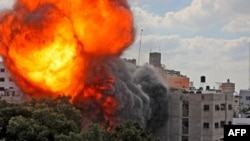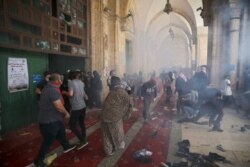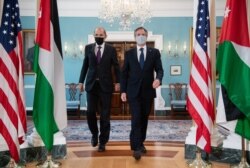The fiercest cross-border fighting between Israelis and Palestinians since 2014 has seen a mounting death and injury toll, prompting the United Nations to warn that the conflict could escalate into a "full-scale war." Relentless rocket fire traded between Israel and Hamas militants in Gaza was triggered by weekend unrest at Jerusalem’s Al-Aqsa mosque compound, sacred to both Muslims and Jews. Observers saw hopes fade for a truce brokered for the Muslim Eid al-Fitr holiday starting Thursday.
Observers say incidents during the Muslim fasting month of Ramadan contributed to mounting hostilities including extreme right Israelis marching through East Jerusalem, the threat of forced evictions of Palestinian families in the Sheikh Jarrah neighborhood by Jewish settlers, and clashes between Israeli police and Palestinian worshippers at the Al-Aqsa Mosque compound.
Palestinian leader Mahmoud Abbas’ decision to cancel Palestinian elections that had been scheduled for the first time in 15 years also increased frustrations.
Jordan is the custodian of Muslim and Christian holy sites in Jerusalem under a 1994 peace treaty with Israel. Its top diplomat, Ayman Safadi, was in Washington earlier this week calling for a deescalation.
"We’ve said in Jordan that Jerusalem is a red line and maintaining peace and stability in Jerusalem is key. Our goal right now is ensuring that the escalation stops," he said.
Former Jordanian Foreign Minister Marwan Muasher told CNN he is pessimistic about prospects.
"Today there are 250,000 settlers in East Jerusalem alone, when you talk about a two-state solution, how are we going to separate the two communities? If the international community is serious about a political solution, then the occupation has to end. We are already seeing a shift in the Palestinian attitude towards demanding equal rights in the areas they live in," he said.
Jordanian analyst Labib Kamhawi told VOA that Palestinians in Jerusalem drew attention to their plight after the issue had been put on the back burner by the former Trump administration for the past four years. President Joe Biden has concentrated on Iran, China and climate, but Hamas and Israel have escalated events.
"The Americans now will do something. Hamas fired missiles, turned the events in favor of Netanayhu," he said. "Otherwise, things were in favor of the Palestinians in Jerusalem. The Americans will pressure the Israelis into making a swift retaliation and sort of close the file until the Americans are ready to play a more active role."
Although Washington has sent Deputy Assistant Secretary of State Hady Amr to meet Israeli and Palestinian leaders to try to quell the violence, Sarah Yerkes of the Carnegie Endowment for International Peace called U.S. leverage “constrained because it has no direct channel to Hamas”. “Hamas has very little to lose by continuing their aggression and the US is not likely to abandon its support for Israel,” Yerkes told The National newspaper in Dubai.
Israel’s defense minister Benny Gantz said it won’t stop its military operation in Gaza until “complete quiet” has been achieved.






